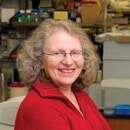By clicking to watch this video, you agree to our privacy policy.
On 30 May, Betty Diamond discussed how the immune system can mediate alterations in brain development and play a role in autism, as part of the Simons Foundation Autism Research lecture series.
Alan Brown provided a post-lecture commentary and context for Diamond’s work on epidemiological studies of autism and related disorders.
You can watch a complete video recording of the event above. Use the comments section below to discuss the lecture and pose follow-up questions.
About the Lecture
As neutralizers of microbial agents, antibodies are major contributors to immune competence. Occasionally, however, they act as autoantibodies, which bind to a person’s own tissue, triggering autoimmune disease. In adults, the blood-brain barrier protects the brain against autoantibodies, but that barrier is not fully competent in fetuses, allowing maternal antibodies to penetrate the fetal brain and potentially alter its development. This mechanism may contribute to some cases of autism.
About the Commentator
Alan S. Brown is professor of psychiatry and epidemiology at Columbia University and director of the Unit in Birth Cohort Studies at the New York State Psychiatric Institute. His research has focused on prenatal exposure to infectious, immunologic, nutritional and toxic factors, and its association with risk of schizophrenia, bipolar disorder and autism. He demonstrated earlier this year that elevated maternal C-reactive protein, an inflammatory biomarker, is related to a significantly increased risk of autism in the child. He is leading large, multi-site national birth cohort studies of prenatal biomarkers, developmental pathways and familial vulnerability based on an archived biobank and nationwide registries in Finland.




